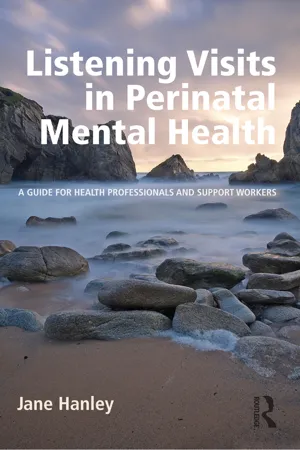Anxiety
Anxiety is a common and understandable feature in perinatal mood disorders, but it is important to distinguish between what is a relatively mild anxiety or worry, and that which might indicate a more severe underlying mental health problem. Anxiety and stress is usually characterised by excessive worry, but it is difficult to control and causes significant distress. Common features are restlessness, irritability, constant tenseness and weariness. Concentration is problematic and the sleep pattern is often disturbed. The symptoms are usually experienced on more days than they are not.
Hyperemesis gravidarum (HG) may be a predictor of increased anxiety during pregnancy (Martin 2012). While an association between HG and mental illness seems likely, Kim (2009) found there is currently insufficient literature to support this link. However, studies have shown that women who suffer from severe HG are at increased risk of cognitive, behav ioural and emotional problems during their pregnancy, and McCarthy et al. (2011) also found that these women had a higher rate of spontaneous premature birth, compared with women who did not suffer from HG. There is no doubt however that the thought of the transition from pregnancy to motherhood can be an uncertain time and for some mothers may heighten the risk factors of stress and anxiety (Emmanuel et al. 2009, Annagur 2013).
Other anxiety disorders with similar features include social phobias, post traumatic stress disorder, obsessive compulsive disorder, panic attacks, and eating disorders. Social phobia may have its origins in the teenage years. It is characterised by a marked and persistent fear in social or performance situations, in which there is exposure to unfamiliar people or possible scrutiny by others. For some mothers there may be a fear of humiliation or embarrassment when confronting strangers. The disorder itself can be a problem, but coupled with the thoughts of striving for perfection in motherhood, can lead to self-deprecation and in some cases, panic attacks.
Panic attacks consist of a range of anxiety-type symptoms with sudden onset and a limited duration, often lasting just a few minutes, but to the mother the time span is immeasurable. The cause of an attack is often unknown and may occur when the mother has felt anxious in a similar situation in the past. The symptoms can include palpitations, chest pain, choking sensation, ‘butterflies’ in the stomach, dizziness and feeling detached from reality, caused by hyperventilating. It is often frightening, and the difficulty in controlling the breathing exacerbates the feelings of vulnerability. It can be misinterpreted as an asthma or heart attack. Once identified it is easy to manage by reducing the pace of the breaths.
Symptoms of anxiety are also seen in mothers with obsessive compulsive disorder (OCD) which is characterised by recurrent intrusive thoughts, which can lead to repetitive behaviour. Attempts to resist the urge to carry out these behaviours can lead to severe anxiety (Zimbalidi et al. 2009, Abramowitz et al. 2010). Some of the more common behaviours include frequent hand washing and excessive cleaning. In the pregnant mother it might be obsessive thoughts about her unborn baby and often, in the case of the postnatal mother, it is the constant need to check the baby to ensure they are still breathing. It is believed it begins during the teenage years and can affect one in fifty people. Although not always easy to recognise, for the mother and her family the disruption to everyday life can be quite marked, as the obsessional and compulsive behaviour can prove exhausting.
Post traumatic stress disorder (PTSD) mirrors the symptoms of anxiety and is the collective term for a number of reactions which may happen to anyone who has experienced a severe traumatic or life threatening event. PTSD may be delayed for months or even years and is usually triggered by an incident that is reminiscent of the original distressing situation. This may be repeatedly experienced by flashbacks of the event and nightmares. There have been reports of mothers experiencing PTSD following a difficult labour or traumatic delivery and therefore it is important, as part of the therapeutic process, to encourage the mother to talk about her birthing experience (Garthus-Niegel et al. 2013).
Eating disorders are often caused by, or are a cause of, anxiety. One fifth of mothers suffering from an eating disorder also have a relative who also has the condition, though it is unclear whether it is hereditary, as a result of a dysfunctional relationship, sexual abuse or learned behaviour. It is possible for an eating disorder to co-exist with anxiety or depression.
The condition may be more apparent during the perinatal period as a result of the mother’s personal desire or social pressure to return to and maintain her pre-pregnancy figure following the birth of her infant. It is of concern in both the ante- and postnatal period as both the mother’s and her infant’s nutrition may be compromised. Some women believe their body image is more import ant than the pregnancy, accepting the pregnancy, but not the inevitable weight gain. Some adolescent mothers, in particular, may be fixated with the populist culture that equates a lean body ...
